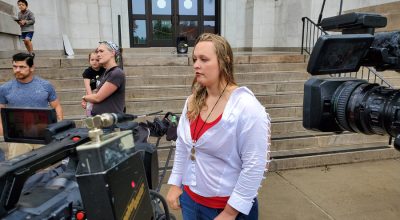
The Tennessee court system says it has had no reports of anyone being denied access to courts, and so denies a joint petition of Tennessee Coalition for Open Government and others for court action to protect the public’s constitutional right of access to the courts.
By David Tulis / NoogaRadio 92.7 FM
Among Americans chafing under the CV-19 regime is a criminal defendant in Lawrence County. “I am not going to wear a mask when I walk in the door,” says Arthur Jay Hirsch, a private businessman and longtime student of law. “They try to, without your permission, try to take your temperature with this little gun. I just hold my hand up immediately. I don’t let them get near me.”
“They have no authority for their order. Show me the evidence this is a disaster. They don’t even say what kind, what classification. It says disasters must be categorized in one of three ways. Which one is it? You didn’t say. What is the evidence? What department from federal and state is saying masks are absolutely essential. *** Fauci says they are not effective. So I am going to be there. I’m going to have a statement written.
Mr. Hirsch, known as “Fiddle Man of Lawrence County,” says he will have a statement written and give it to a clerk to give to the judge.
“Tell them I’m here. But I’m not complying. I’m not complying against unconstitutional, unbiblical — against natural law, against common sense. I don’t know exactly how I’m going to phrase it. But I will vociferously oppose it, and I will not comply.”
In Hamilton County, the courts under a 40-page May 4 set of orders signed in part by circuit judge Marie Williams forbid more than 10 people in any civil court room “excluding court personnel.” Family members, friends, court monitors, journalists and “support persons” have to obtain a license from the judge to be in the room: “Support persons shall be permitted in the courtroom only at the discretion of the judge” (Page 5). “No extraneous persons will be permitted in the courtroom.” https://www.tncourts.gov/sites/default/files/docs/11th_-_submitted_5-1.pdf
On the criminal side, the three judges in a 14-page order say members of “media” may attend in-person events “upon approval” but not freely — only “under the court’s safety protocols.” The public is banned from attending any hearing or trial, and the court “will permit only the following persons to be present,” including “the immediate parties to the action and their counsel,” crime victims, “permitted media as approved below” and court staff.
Since when is any person among the free people of Tennessee an “extraneous person”?
Judges insist courts open
The judges in a July 13 “order regarding joint petition for court action to protect the public’s constitutional right of access to the courts” deny the petition. Their ruling came a month and 13 days after the petition was filed.
On March 13, 2020, in response to the COVID-19 pandemic, the Chief Justice of the Tennessee Supreme Court declared a state of emergency for the Judicial Branch of Tennessee government and activated a Continuity of Operations Plan for the courts of Tennessee. On March 25, 2020, the Court continued the suspension of in-person court proceedings and the extension of deadlines.
On April 24, 2020, the Court modified the suspension of in-person court proceedings and further extended deadlines. Pursuant to the Court’s April 24, 2020 order, the Court has reviewed and approved comprehensive written plans received from all thirty-one (31) of Tennessee’s judicial districts to gradually begin the conduct of in-person court proceedings. On May 26, 2020, the Court extended the state of emergency and eased the suspension of in-court proceedings, specifically addressing the resumption of jury trials after July 3, 2020.
On June 1 the groups filed a petition requesting that the Court “use its administrative and emergency power to protect the public’s Constitutional and common law right of access to court proceedings during the COVID-19 pandemic.”
The Petition specifically requests that the Court provide appropriate guidance by means of clear and express “mandates” to all Tennessee courts, judges, and judicial branch personnel with respect to the preservation and accommodation the public’s right of access to the courts by a variety of suggested means. The Petitioners themselves correctly note, however, that “it may be difficult to craft either an appropriate state-wide mandate for public access to courts during the pandemic, or specific guidelines or tools individual courts might use to ensure public access.”
The judges say that in the “state of emergency” they have “continuously provided guidance to the trial courts and judges of this State regarding the operation of the courts, including guidance with respect to the public’s access to court proceedings.”
At no time has the 07/13/2020 2 Court countenanced or approved an outright ban on public access to the courts. In fact, the Court has strongly encouraged all courts and judges to remain diligent in attempting to address public and media access. As the Petitioners point out, the Court has tried to lead by example in this area by use of video conferencing and live-streaming of proceedings before this Court. Additionally, the Petition does not allege and, to date, the Court has not been advised of any specific instances in which the public’s access to court proceedings has been denied. [Emphasis added]
The judges say that if petitioners “become aware of any instances in which the public’s right of access to the courts is infringed or denied, they are encouraged to bring the matter to the attention of the Court.”
But the judges in a per curiam (unanimous) memorandum deny the petitioners’ request.

